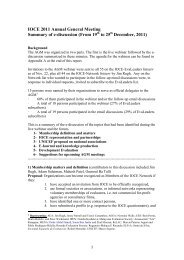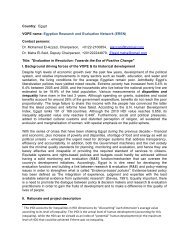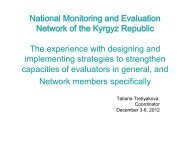The Program Evaluation Standards in International Settings
The Program Evaluation Standards in International Settings - IOCE
The Program Evaluation Standards in International Settings - IOCE
Create successful ePaper yourself
Turn your PDF publications into a flip-book with our unique Google optimized e-Paper software.
29Considerations on the Development of Culturally Relevant <strong>Evaluation</strong><strong>Standards</strong>By Nick L. Smith, Saviour Chircop and Prachee MukherjeeRepr<strong>in</strong>ted from Studies <strong>in</strong> Educational <strong>Evaluation</strong>, Vol. 19(1), 1993, pp.3-13 with permissionfrom Elsevier Science.What standards should be <strong>in</strong>voked <strong>in</strong> establish<strong>in</strong>g proper evaluation procedures whenwork<strong>in</strong>g <strong>in</strong> a different cultural context? Western evaluators work<strong>in</strong>g <strong>in</strong> cross-cultural sett<strong>in</strong>gshave suggested that what constitutes appropriate evaluation behavior depends on the culture <strong>in</strong>which one is work<strong>in</strong>g. Smith (1991), for example, provides a detailed summary of cultural<strong>in</strong>fluences <strong>in</strong> evaluation, not<strong>in</strong>g the different cultural norms about what constitutes <strong>in</strong>competent,unethical, and crim<strong>in</strong>al behavior.For example, <strong>in</strong> the U.S., it is expected that one pay a small amount of extra money tosomeone provid<strong>in</strong>g a service if he or she is a waiter or cab driver, but not if he or she is apolice officer or court clerk – the difference between a tip and a bribe. Other cultures havedifferent standards ... Just what is ethical evaluator behavior and by whose standards do wejudge? Will cross-cultural evaluators have the same problems as U.S. multi-nationalcorporations who <strong>in</strong>sist they have to bribe (tip?) Foreign bureaucrats as the culturallyaccepted way to conduct bus<strong>in</strong>ess, but are then subject to U.S. crim<strong>in</strong>al prosecution?Conduct<strong>in</strong>g evaluations <strong>in</strong> culturally sensitive ways might cause serious problems for theevaluator upon return<strong>in</strong>g home (Smith, 1991, p.17).<strong>The</strong> <strong>Standards</strong> for <strong>Evaluation</strong>s of Educational <strong>Program</strong>s, Projects, and Materials of theJo<strong>in</strong>t Committee (1981) has been developed and widely distributed as a guide to the properpractice of educational evaluation <strong>in</strong> the U.S. To what extent are these standards applicable <strong>in</strong>non-U.S. or non-western sett<strong>in</strong>gs for prescrib<strong>in</strong>g proper evaluation practice? U.S. evaluatorsChapman and Boothroyd (1988) suggest that the comb<strong>in</strong>ed centralized authority <strong>in</strong> m<strong>in</strong>istryoffices and the impact of U.S. AID <strong>in</strong>fluence. . . opens doors to evaluative researchers that are usually unavailable <strong>in</strong> more <strong>in</strong>dustrializedsocieties where teachers are unionized and where student and family rights are given a highlevel of importance. Pr<strong>in</strong>ciples of privacy, the public’s right to know, and the Hatchamendment would never permit many practices <strong>in</strong> the United States that are common <strong>in</strong>evaluation studies <strong>in</strong> develop<strong>in</strong>g countries (Chapman and Boothroyd 1988, p.41).<strong>The</strong>se practices might be seen as violations of the Jo<strong>in</strong>t Committee (1981) standards, or asculturally sensitive and adaptive evaluation procedures. Should an evaluator work<strong>in</strong>g <strong>in</strong> a crossculturalsett<strong>in</strong>g conform to the mores of his or her own culture or to the mores of the culture <strong>in</strong>which the evaluation is be<strong>in</strong>g conducted?






